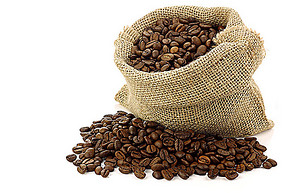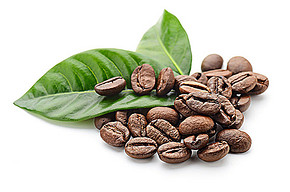Yemeni mocha is a kind of coffee bean with high maturity.
Follow the caf é (Wechat official account vdailycom) and found that Beautiful Cafe opened a small shop of its own.
Yemeni mocha coffee is a kind of coffee beans with high maturity, so it takes more time to roast than ordinary Arabica beans. Because mocha coffee is dried in a very natural way, the color of roasted mocha beans is not uniform, and there is a significant difference in color between beans and beans even if roasted at the same time. For Yemeni mocha coffee, the degree of roasting has a great impact on the flavor of the coffee, in deep roasting, the original wild fruit flavor will become stronger and stronger with the deepening of roasting, and the coffee bean flavor will be more mellow.

Yemen is the first country in the world to produce coffee on a large scale as a crop. Coffee was grown in Yemen around 525 AD and quickly spread, and Yemen has been a major supplier of coffee to Europe for the next two hundred years.
Yemen is a country with relatively high temperatures, especially the western coast near the Red Sea, which is hot and boring. The most suitable area for growing coffee in the country is the mountains of western Yemen, which is rugged with an elevation of more than 900 meters, so coffee farms are built at an altitude of 900 to 2000 meters above sea level. The shape of the Yemeni mocha beans is also different. the relatively dry soil and air make the coffee grown here smaller and harder than those grown elsewhere, and the raw beans have a pale green or yellow color. At the same time, it has a unique flavor.
In Yemen, coffee beans have been treated by sun-drying, so some people think that Yemeni mocha coffee will have a fishy smell. More interestingly, the dry climate in Yemen makes some coffee fruits become very dry and hard before they are picked, so it becomes natural to remove the peel and pulp of coffee by sun-drying. coffee farms in Yemen have homemade stone mills to remove the dried peel and pulp of coffee, and then pick out clean and full beans by hand.
In Yemen, farms in desert valleys and stepped farmland on the slope of the canyon are called "Wadi". Stepped farmland is located in the mountains at an altitude of 2200m, which is a suitable environment for the production of high-quality export coffee beans. clean the coffee by drying
Leave the beans on the roof of the house for about a week to dry. Store or circulate in a semi-dry state, and mildew will not occur in the drying process in mountainous or Sana'an areas because of the cooler climate. High-quality coffee has Matari, Ismail, Haraz and so on. Yemeni coffee beans are small in size, round in shape, with high-quality sour coffee and unique fruit aroma, mellow and smooth taste, and can feel very distinct characteristics.
In Yemen, after the drying period, the peel and pulp of coffee cherries can be made into beverages for circulation on the market. Yemenis do not have the same habit of drinking coffee as Ethiopians, but are more likely to make coffee skins and flesh with ginger, a drink known locally as "Kahawa".
Important Notice :
前街咖啡 FrontStreet Coffee has moved to new addredd:
FrontStreet Coffee Address: 315,Donghua East Road,GuangZhou
Tel:020 38364473
- Prev

Yemeni mocha coffee: distinctive quality or taste
Follow the caf é (Wechat official account vdailycom) found that the world needs more than 6 billion kilograms of coffee a year, the coffee income is more than 12 billion US dollars, Arabica coffee looks like small coffee, mocha coffee is exported to European market or other markets through ports, coffee export has also become one of the Arab sources of income, Yemeni coffee
- Next

Is Yemeni mocha coffee a single coffee?
Following Cafe (official Wechat account vdailycom) found that Mocha Coffee, a small shop opened by Beautiful Cafe, takes its name from Mocha in Yemen, a port that is no longer usable], which is almost filled with sand, no longer a port, but a sandbar. As a kind of individual coffee, Yemeni mocha has a unique charm and a long history.
Related
- Detailed explanation of Jadeite planting Land in Panamanian Jadeite Manor introduction to the grading system of Jadeite competitive bidding, Red bid, Green bid and Rose Summer
- Story of Coffee planting in Brenka region of Costa Rica Stonehenge Manor anaerobic heavy honey treatment of flavor mouth
- What's on the barrel of Blue Mountain Coffee beans?
- Can American coffee also pull flowers? How to use hot American style to pull out a good-looking pattern?
- Can you make a cold extract with coffee beans? What is the right proportion for cold-extracted coffee formula?
- Indonesian PWN Gold Mandrine Coffee Origin Features Flavor How to Chong? Mandolin coffee is American.
- A brief introduction to the flavor characteristics of Brazilian yellow bourbon coffee beans
- What is the effect of different water quality on the flavor of cold-extracted coffee? What kind of water is best for brewing coffee?
- Why do you think of Rose Summer whenever you mention Panamanian coffee?
- Introduction to the characteristics of authentic blue mountain coffee bean producing areas? What is the CIB Coffee Authority in Jamaica?

